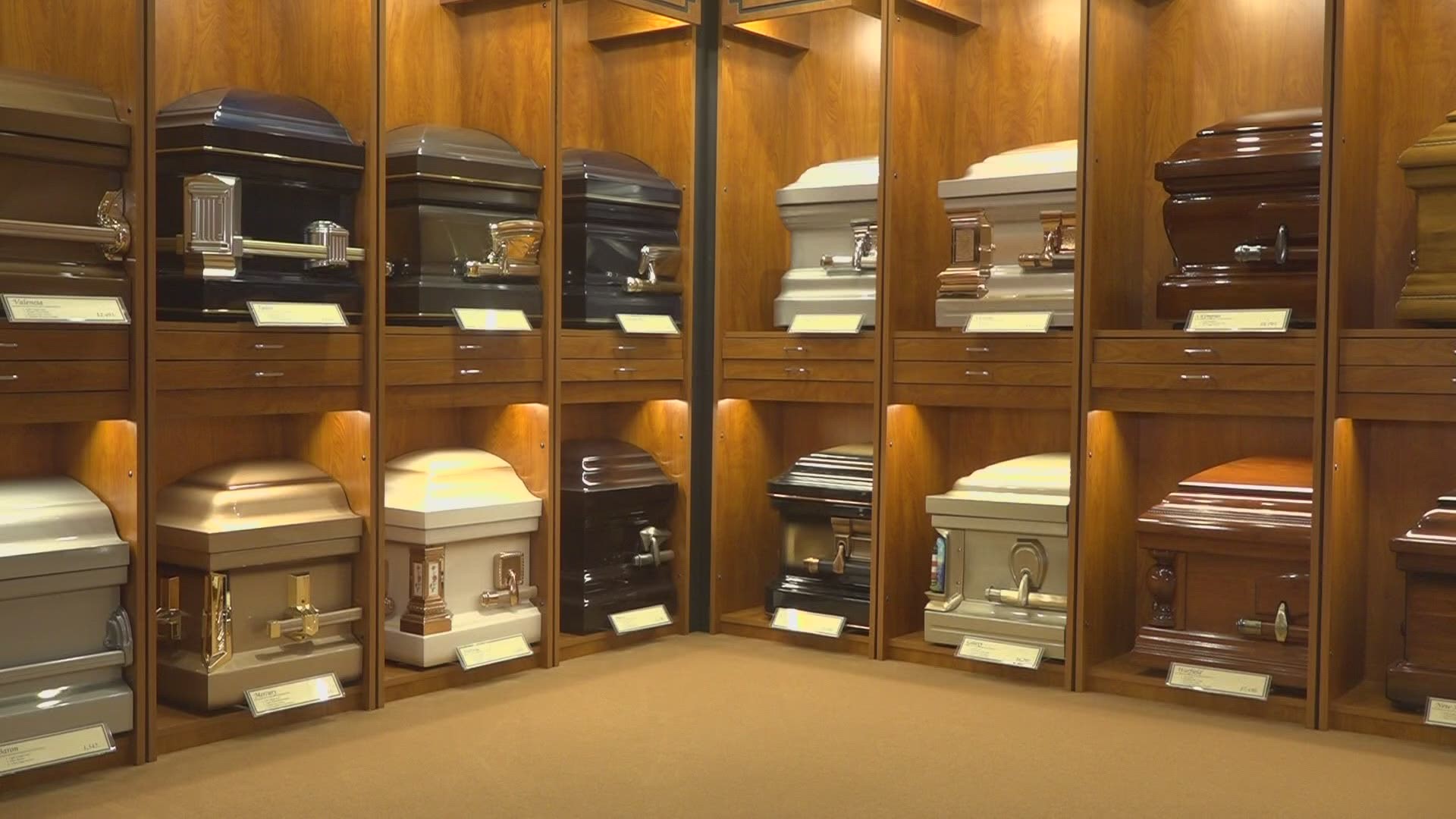MAINE, USA — Families who recently lost a loved one are having to grieve in different ways as limitations on crowd sizes for funerals and services remain.
Brookings-Smith funeral home in Bangor has changed a few things to keep its staff safe, including hiring younger workers who are less vulnerable to COVID-19. The funeral home tells NEWS CENTER Maine many families nowadays are not being able to say goodbye to loved ones living in nursing homes because of the strict visitation guidelines.
Jim Fernald is the funeral service practitioner and general manager at Brookins-Smith.
"Because some people haven't seen their mom, dad, brother, sister, could be months...the viewing process has been all that more important to give them that final goodbye, coming to the funeral home has been the location where that happens and dealing with us is kind of the first stage of the reality of death and it's a real key part of the grieving process," Fernald said.
He said bodies are being stored longer waiting for loved ones to come from away, or in some cases, waiting for family members to be COVID-free.
Fernald said another trend these pandemic days is to hold the service for later when family members from away have fewer travel restrictions and a bigger service can be held.
That's the main reason why virtual services have become popular, with so many restrictions in-place families, are starting their grieving process typically with a virtual service once the loved one passes away and making it easier for more people to attend memorials.
The funeral home's director said despite all the changes in place, funeral homes are doing what it takes to help families celebrate the lives of their departed.
"A lot of people think that you can't get together, but the reality is you can. You can still gather as a family, and a small group and we encourage that. Memorialization is like a bridge between time with somebody before they die, and to this new life without them no longer there, so we really encourage memorialization," Fernald said.
He added that many families are not being able to follow the same ceremonial traditions, some people are delaying services to the summer, hoping more people can safely attend then.
Vicky Perry lost three of her close family members in the last nine months: her mother, her aunt, and her uncle.
"It's been a bad year for the extended family on my mother's side."
Perry's mother had COVID.
She decided along with her family members to hold the funeral ceremonies until this summer.
"We decided we would do something together for them. We are very much hoping that by next summer as everybody is, maybe things would have changed enough," Perry said.
"A lot of people think that they can't get together with people, and we can through social distancing and limiting people, but it's such a key part of grieving and accepting the reality of death," Fernald said.
Travel restrictions, getting COVID tests to enter some states and leave others, and personal limitations are making families delay the service.
"So we've had to hold remains longer than we usually have for that process to see its way through," Fernald said.
Many chapels have installed cameras to allow small funeral services to be streamed for those who can't be there in person. That's a practice that may continue for months or even years. Aside from services, there are other changes to how people grieve these days.
"The community rallies to take care of the bereaved. We make the meals for them, we hang out in their house, we keep them company...that's all gone nobody goes into other people's homes and that experience of comfort has been taken away from people," Rabbi Bill Siemers, from Congregation Beth Israel in Bangor, said.
Rabbi Siemer said the custom among jews is for members of the community to help personally with the preparation, transportation, and burial of the body. Because of the danger of contracting the virus, synagogues in Bangor have relied on the services of funeral homes like Brookings-Smith.
"When this happened and they realized we were going to be able to personally dress our beloved ourselves, they stepped forward and did as much as they can do."
Reverend Chad Poland is the pastor and teacher of All Souls Congregational Church in Bangor. He said many funeral services have been postponed, travel is complicated, communal singing is discouraged, limited gathering numbers, etc.
"A lot of families are just choosing to wait, to delay services and so we have a number of folks who are waiting until the summer or even the fall to gather for those celebrations of life," Reverend Poland, said.
Reverend Poland said a 'ministry of presence' or the act of being present for someone going through a very difficult loss is complicated these days.
"Some families have chosen to move forward with those services whether here or at the gravesite, but many have delayed until the summer or fall."
Perry said waiting has complicated her grieving process, but when her loved ones passed away, her family members did an intimate a Zoom service to honor the lives.
"It's hard to wait in this sense, but I think it's really important. I didn't want to be responsible for bringing a whole lot of people together," Perry said.
"We encourage people to do something now. It will help the grieving process," Fernald said.

